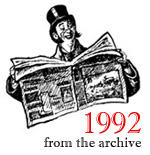
Tribute to a Mentor: Paul Hanly Furfey (1896-1992)
REVEREND SOCIOLOGIST
On June 8, barely two weeks before his 96th birthday, Msgr. Paul Hanly Furfey died in a Washington, D.C., hospital. In almost a half-century of teaching at Catholic University (32 of those years as chairman of its sociology department) he earned recognition and respect for his scholarship, but even more for a host of books and articles that established him as one of Catholicism’s greatest champions of peace and social justice. Over the years many priests involved in organized efforts to eliminate racial injustice and the multitude of other social problems which still shame American society have traced their awakening to what Furfey called “social sin” to reading his Fire on the Earth in their seminary days.
His earliest works — The Gang Age (1926), The Growing Boy (1930), You and Your Children (1929), and Social Problems of Childhood (1929) — were more strictly “research-oriented” in nature, as were treatises on techniques such as “product-moment correlation co-efficient” and tests for the measurement of nonintellectual traits and developmental age. He never lost his commitment to methodological rigor, but Fire on the Earth (1936) shifted the emphasis to value-oriented and sometimes controversial analyses of social thought and the duty of Christians to engage in efforts for constructive social reform.
The controversies arose from two sharply contrasting quarters. On the one hand were Catholics who objected to his insistence that failure to apply religious principles and teaching to one’s daily life and social behavior were responsible for the patterns of injustice he identified as evil, even sinful. The very titles of certain of his books give a clue to the challenges posed to those who were only too willing to “go along” with things as they were: The Mystery of Iniquity (1944), The Respectable Murderers (1966), and The Morality Gap (1968). To the conservative minded, the very term, sociology, sounded suspect enough without linking the discipline to conclusions that praised and even promoted “Christian radicalism” and “Christian revolutionism.”
Furfey’s academic peers raised essentially the same objection, but in reverse, giving rise to a lively intra-disciplinary debate concerning scholarly standards. In the 1940s and 1950s sociologists, burdened with something akin to a professional inferiority complex, were intent upon establishing themselves and their discipline as scientific, with the “hard” physical sciences serving as the model. Research into human behavior had to be “empirical” in the positivist sense and strictly “value-free” in approach and interpretation. Catholic sociologists in particular were engaged in a continuing debate within the (then, but no longer) American Catholic Sociological Society as to whether there should be, or even could be, a “Catholic sociology.” Furfey, for his part, went so far as to speak of supernatural sociology!
You May Also Enjoy
Dobbs was the triumph of the “states’ rights” approach to abortion, an approach that never had the consensus backing of the pro-life movement.
Smell as Catholic as the Pope... Cross-Dresser Blesser... Chickens for Christians... New Twist on polish Jokes... Could You Not Work Eight Hours?... Linguistic Ethnic Cleansing...Fr. Fisticuff & Sr. Sidekick... 'I Pledge Allegiance...' ... Disco-Dancing Nuns... Suburban Stonehenge

